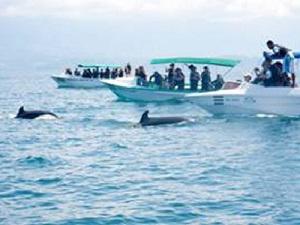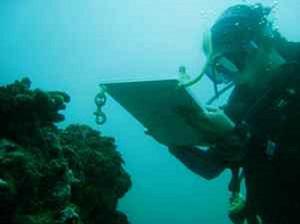Catalina Molina
This project will create precedents for the adoption of best environmental practices among the marine tourism operators. We expect to regulate marine tourism in the region through the enhancement of responsible practices and the understanding of marine tourism impacts.

Practice during whale watching.
During the last decade, the Costa Rican South Pacific has experienced an unregulated increase in marine tourism activities. The Caño Island Biological Reserve (CIBR), which has the broadest coral population of the Costa Rican Pacific coast, has around 2.700 marine hectares, but only four diving points for receiving more than 1500 visitors per month. Drake Bay, an important breeding and feeding area for 12 cetacean species have increased it touristic income around 500% in the last 7 years. In Sierpe, a Ramsar Site, channels are used as routes for hundreds of tours boating to Caño Island and others destinies. Unfortunately, most of the tour-operators lack of proper training and they are likely to be a potential stressful factor for the coastal marine ecosystem.

Caño Island reef underwater survey.
This project is filling information gaps of the current situation of marine tourism (whale watching and diving) in order to generate baselines to evaluate environmental and socioeconomic impacts. Understanding those impacts will allow us to promote an environmental awareness among tour-operators, tourists and the hosting communities. This will also constitute the framework to developing indicators that will provide an evaluation system to asses the best practices effects on it execution stage.
In addition, we will be assessing tourists’ willingness to pay (WTP) for conservation programs, which will let us understand about how demand behaves regarding to the environmental health and would motivate tour operators to implement better practices.
This project includes a program for strengthening the skills of the tour guides. Being in direct contact with tourist allow them to teach tourists, by providing good and interesting information along with a conscious behaviour about the ecosystem threats. Useful, attractive material will be designed especially for tourists with simple guidelines that will contribute to a responsible travel.
Best practices will be designed according to ISEAL guidelines, and will be elaborated in the framework of codes of responsible tourism known worldwide, such as those of the Coral Reef Alliance. The second project stage will be sponsored by other NGO’s and pretends to achieve the design of better marine tourism practices. Our guidelines, in a short term will constitute a voluntary code for a local network. We expect this code to develop with time in a policy, such as a certification validated by an international organism.